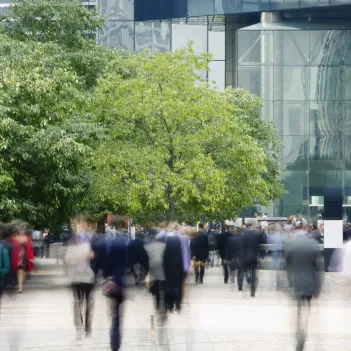About DUT Call 2022
The DUT Partnership launched its first call in September 2022 with an available budget of approximately €90 million for projects addressing critical challenges under the three Transition Pathways.
The call is co-funded by the European Commission (EC) under the Horizon Europe framework programme.The call is also part of the MICall 2022 to contribute the Urban Transition Mission of Mission Innovation.
Latest updates
- Nov 2022
The first stage of the DUT Call 2022 closed. More than 1600 project partners applied for approximately €210 million in funding in 188 proposals. - Mar 2023
78 proposals were invited to the second stage. - Jul 2023
48 proposals were suggested for funding.
The 15-minute City Transition Pathway (15mC TP) addresses challenges of urban mobility, logistics, public space and proximity-based policies to promote implementation of climate neutral, resilient neighbourhoods for all. It draws on research and innovation projects to showcase a diverse mosaic of approaches that drive mobility transitions. The 15mC TP aims to enable analysis, development and testing of ideas, tools and innovations for 15-minute cities within co-creative and transdisciplinary settings.
15mC call topics
- Strengthen the mix of urban functions and services
- Foster sustainable options for personal mobility and logistics in urban outskirts (and beyond)
- (Re)imagine urban public spaces and streets for vibrant, sustainable neighbourhoods
The Circular Urban Economies Transition Pathway (CUE TP) aims to foster urban places, communities and neighbourhoods that are sustained by circular resource flows and enhance the wellbeing of their inhabitants and ecosystems. It encourages urban planning and design characterised by regenerative urbanism, favouring the combination of circular principles, urban greening, and equal access to urban spaces and resources.
CUE call topics
- Urban resource sharing and circularity
- Nature-based solutions (NBS)
- Urban food systems
The Positive Energy Districts Transition Pathway (PED TP) aims to develop innovative solutions for planning, large-scale implementation, and replication of PEDs across Europe’s urban and peri-urban areas. By combining energy efficiency, renewable energy production, and energy flexibility at the local level, PEDs offer and contribute to affordable energy systems, affordable quality housing, and competitive, resilient and inclusive local economies for cities through energy communities, contributing to European goals such as the SET Plan and the EU Mission on Climate-neutral and Smart Cities.
PED call topics
- Energy communities – energy transition driven by civil society
- Energy flexibility strategies – technological, legal, societal challenges
- Energy efficiency in existing urban structures
